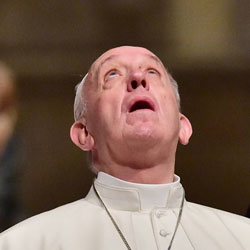There’s nothing to add to this self-explanatory headline, nor even much reason to follow the link. The title says it all: SCANDAL: Vatican police raid cardinal’s apartment to stop drug fueled gay party.
The lede is easy to believe: “Pope Francis is reportedly furious at the news as he has worked hard to clean up the Vatican.” It evokes the anger Jesus directed at the scribes and Pharisees. The Lord, who was a friend to sinners in other contexts, always eager to minister divine mercy and foster conversion, had no time for hypocrites:
“But woe to you, scribes and Pharisees, hypocrites! because you shut the kingdom of heaven against men; for you neither enter yourselves, nor allow those who would enter to go in . . . Woe to you, scribes and Pharisees, hypocrites! for you are like whitewashed tombs, which outwardly appear beautiful, but within they are full of dead men’s bones and all uncleanness. So you also outwardly appear righteous to men, but within you are full of hypocrisy and iniquity.” (Mt 23 ff)
This is a reaction I think many of us intuitively share. Priests who hear confessions are well acquainted with the wage of sin, so we’re not easily scandalised. But I am scandalised by exposés of priests leading double lives. I’m sure I’m not the only one to share our Lord’s visceral reaction against the scribes and Pharisees. But why? Why do some sinful contexts cause more scandal than others?
It might be a case of “there but for the grace of God go I,” but that’s no explanation. We can all think that about any number of sins, and they do not possess the shock value of the deliberate and systematic hypocrisy of double lives. What makes this sort of sin so different?
In today’s Office of Readings, St Augustine sheds light on the matter. Augustine, you might recall, is famous for praying “God, make me good, but not yet.”
“We should be displeased with ourselves when we commit sin, for sin is displeasing to God. Sinful though we are, let us at least be like God in this, that we are displeased at what displeases him. In some measure then you will be in harmony with God’s will, because you find displeasing in yourself what is abhorrent to your Creator.”
It’s an interesting idea, isn’t it? We should hate sin, because God hates sin. And if we do hate our sins, then even in the midst of sin, there is some harmony with the will of God. This is not only perfectly intelligible, but also widely experienced. Who doesn’t identify with St Paul’s quandary?
“I do not understand my own actions. For I do not do what I want, but I do the very thing I hate. Now if I do what I do not want, I agree that the law is good. So then it is no longer I that do it, but sin which dwells within me. For I know that nothing good dwells within me, that is, in my flesh. I can will what is right, but I cannot do it.” (Rom 7:15-18)
But here’s the rub. When a person is systematic in their hypocrisy, when they lead a double life, they have accommodated sin. Far from hating sin, this sinner plans his life around it. And so, by Augustine’s suggested measure, there is no semblance of harmony with God at all.
Hence we have the Lord’s prayer in today’s Gospel:
“I bless you, Father, Lord of heaven and of earth, for hiding these things from the learned and the clever and revealing them to mere children.” (Mt 11:25)
I think children are probably incapable of leading a double life. They are perfectly capable of sin, but in their simplicity they don’t accommodate sin. And, in their humility, when children are in trouble, they are quick to seek a remedy. The “learned and clever,” by contrast, have the means to lie about their sin — even to themselves — which is the first step to a pharisaical double life.
We can, all of us, adapt Augustine’s prayer: “God, make me good.” (There’s no need for temporal qualifiers.) None of us can be saints by force of will — we need God’s grace. We’re sinners obliged to start again and again and again — like small children, learning to walk, recovering from every fall, always persevering. We should avoid sin, and with God’s grace we can avoid sin. But in those moments we do sin, so long as even then, we hate the sin, we avoid, I think, the pharisaical mire.
Ab insidiis diaboli, libera nos, Domine.






Recent Comments